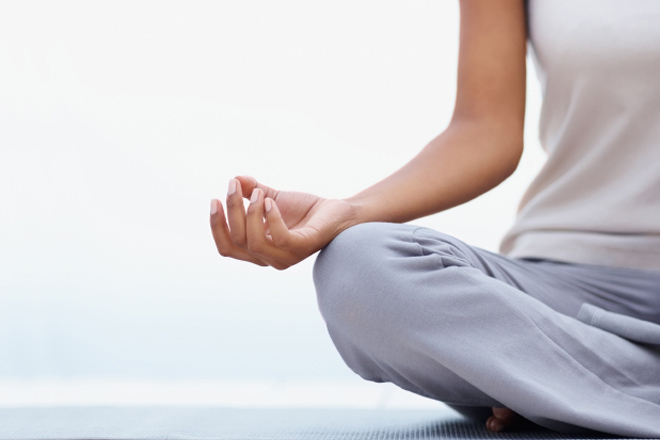As we padded barefoot out of the yoga class, I grabbed my boyfriend’s arm and urgently mouthed: “I have to tell you something.”
He whispered back: “You farted in class?”
I whacked him on the arm – “No!” — and then, a safe distance from our classmates, I explained with a smile: “My third eye opened.”
He tilted his head at me in the universal expression of “Girl, you crazy.”
It wasn’t so much what I had said, but that I of all people had said it. I’m a skeptic — philosophically agnostic and politically atheist, if that makes sense – and constitutionally offended by anti-science hocus-pocus. I almost refused to go to this yoga studio when I saw a poster for an astrology workshop in the waiting room. Any time a dubious idea arises in conversation with friends — whether it’s about ghost sightings or the benefits of a juice cleanse — I always ask questions about “scientific proof” or “confirmation bias.”
My boyfriend recently told me regarding my methodological approach to things: “Sometimes, the way you think … it’s like a robot.” Once, he even referred to me as “the Magic Killer.”
So you can imagine his incredulity — on multiple fronts — when I explained on our walk home that during the meditation portion of the class I’d felt the whole of my body focused on one point in the middle of my forehead; it was as if my entire self existed there. But, typical to character, I attempted to explain it in purely physical terms: “It must have been the vibrations in the music – the chimes. Maybe it’s something about the sudden stillness after getting your blood circulating. Maybe the mysticism of the third eye arose from that purely physical phenomenon.”
That’s pretty much how my newfound relationship with yoga goes: I’m a believer first and a skeptic last. It’s the only space in my life where that is true.
Now, yoga is more spiritual than religious, but it undeniably has religious influences and accents – from the vibrantly colored murals of Hindu deities on the walls of my yoga studio to the closing Sanskrit prayer. Then there’s the defining “om,” which has religious significance: According to Hinduism, the vibration is said to be the manifestation of God.
I’m the sort of person who begrudges having to capitalize “God,” OK? I find it difficult to join in prayer at big family dinners: I’ll remain respectfully silent and still, but can’t bring myself to clasp my hands together or offer an “amen.” I suppose I harbor a good deal of atheistic resentment. The fact that I’ve many times participated in, and enjoyed, friends’ seders suggests there’s a specificity to it, though: I object to religion when it feels forced upon me.
And choosing something with religious associations, no matter how tenuous or abstract, is something I’ve never consciously done before – not beyond a vicarious, anthropological sense. And choosing something with spiritual associations is something I haven’t done since – well, since I carried around a shoebox in second grade, willing myself to believe that there were fairies inside. Until recently, the closest I’ve gotten to “spiritual” is in my reverence for nature and literature, which is a far cry from any sort of ritualized, group spirituality.
And then there was yoga.
I’ve always wanted to have a church to go to. I’ve fantasized about what my dream version of this would look like: a weekly gathering where passages are read from great literature, where experts give workshops on their area of expertise — whether it’s psychology, philosophy or art. (Which sounds a whole lot like … college.) Yoga doesn’t exactly satisfy all of those demands, but it comes close. My teachers read a range of inspirational (see, I even cringe at that word!) quotes and poetry, from Rumi to Philip Booth. I take from it what I want and what I believe. It’s open-source spirituality.
I never before understood theists who pick and choose from a religion like Christianity. Now I do.
When my yoga teacher had us clasp our hands over our hearts and said, “May all beings everywhere be happy and free” — all of which looked a whole lot like prayer to me — not only did I do it, but I followed up with an enthusiastic “namaste” (which in my head sounds like, “na-ma-motherfucking-stay”). That isn’t because I think that prayer works, or that a higher being is listening, but that I believed in the sentiment.
I thought I was going for the workout. I thought I would disregard all the “spiritual crap.” The opposite turned out to be true: I started going for the spiritual crap.
The other piece of this — the piece I hadn’t been planning to mention when I started writing this, and yet here I am — is that my mom is terminally ill. Her diagnosis didn’t make me reevaluate my beliefs, but it did allow for some “magical thinking,” as Joan Didion said. Desperation doesn’t answer to reason. Being told that the world will be without my mom feels a whole lot like being told that gravity will cease to exist but life will keep on going: The basic principles of my reality will be turned upside down. I need something to believe in right now — even if it’s ultimately just in myself.
Yoga is all about giving us new ways to believe in ourselves, whether it’s conquering a difficult pose, or developing new physical strength. (I’ve turned into a fratty jock, flexing my muscles and imploring friend to “touch it!”) It’s corny, it’s spiritual, it’s New Agey — and you know what? I don’t mind. For me, “the Magic Killer,” there is something freeing in that surrender of, not skepticism, exactly (I still don’t believe that my “third eye” exists as such), but cynicism.

